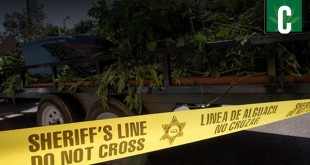A judge in Los Angeles has blocked a popular smartphone app from directing users to marijuana delivery services in the city.
 Los Angeles County Superior Court Judge Robert O’Brien issued an injunction in late December barring the Nestdrop app from operating in L.A. The app, the first of its kind, helps users find medical marijuana delivery services across California.
Los Angeles County Superior Court Judge Robert O’Brien issued an injunction in late December barring the Nestdrop app from operating in L.A. The app, the first of its kind, helps users find medical marijuana delivery services across California.
City Attorney Mike Feuer sued Nestdrop in December, arguing the app violates city ordinance by enabling delivery services. The city’s lawyers asked the judge to stop the app from operating in Los Angeles. They’re also seeking civil damages.
Feuer said the app violates Measure D, the initiative approved by voters last year that limits the number of medical pot shops in the city to 135 and bars cannabis delivery. Before Proposition D passed, city officials estimated there were more than 1,000 dispensaries in Los Angeles.
“This app is a flagrant attempt to circumvent the will of the voters who passed Prop D,” Feuer said.
Marijuana delivery businesses are becoming increasingly popular in the city as officials close dispensaries. But delivery has been available in L.A. for many years. Only after Prop D passed did the city start cracking down. The end result: Countless patients will have a harder time getting their medicine.
Many of these people are disabled – hence the need for cannabis. Some can’t travel easily. Now that shops are becoming increasingly scarce, those patients will have to spend more time, more energy, and more money trying to get their meds.
Nestdrop released a statement saying delivery services would continue despite the ruling. The app, however, will no longer be available in Los Angeles.
“Today’s ruling does not stop the delivery of medical marijuana in Los Angeles by the dozens of delivery services in the city,” co-founder Michael Pycher said in the statement. “It only restricts Nestdrop from communicating information between a patient and a dispensary.”
 Pycher said the company plans to continue serving other parts of the state, including elsewhere in Southern California. Many of the state’s cities have yet to ban delivery, though that seems to be the direction many of them are taking.
Pycher said the company plans to continue serving other parts of the state, including elsewhere in Southern California. Many of the state’s cities have yet to ban delivery, though that seems to be the direction many of them are taking.
Prop D came after years of chaos in California’s medical marijuana system. Even after the city temporarily banned new pot shops several years ago, dispensaries continued to open at a rapid clip. L.A. eventually became a poster child for unregulated medical weed.
The lack of control led to Prop D, as well as ongoing efforts to reform the system at the state level. Those efforts have repeatedly failed, but with legalization approaching in 2016, lawmakers may get serious this year.
 California Marijuana Market Breaking "Marijuana News" from CA
California Marijuana Market Breaking "Marijuana News" from CA


